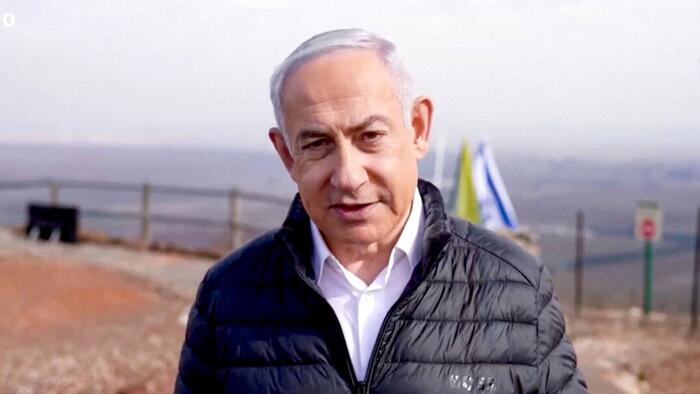Israeli Prime Minister Benjamin Netanyahu announced that Israel’s military has taken control of a formerly established buffer zone in the Golan Heights, following the recent downfall of Syrian President Bashar al-Assad’s regime. In a video statement, Netanyahu declared that the military agreement with Syria, put in place in 1974 by Hafez al-Assad, had effectively “collapsed” over the weekend as the Syrian army abandoned its positions in the region. The escalation came as a result of the instability and power vacuum in Syria, which prompted Israel to act preemptively against potential threats to its borders. Netanyahu emphasized that the Israeli forces had been instructed to secure the area temporarily, highlighting the necessity of ensuring that no hostile forces could establish a foothold near Israel.
The prime minister characterized Assad’s fall as a “historic day” for the broader region, acknowledging the complexities following the government’s collapse. While he noted that the shifting dynamics in Syria could present new opportunities, he stressed the accompanying risks inherent in such transitions. The multi-faceted conflict involving Iran and Hezbollah, longstanding allies of Assad, has been a particular area of concern. Netanyahu pointed towards Israel’s military actions against Iranian positions in Syria as significant contributors to the unrest that has unraveled Assad’s regime, suggesting that their downfall has inspired various factions seeking liberation from authoritarian rule.
In a bid to form potential alliances, Netanyahu extended a conciliatory message to the various ethnic and religious groups within Syria, which include Druze, Kurds, Christians, and Muslims. He expressed Israel’s desire for peaceful relations with these emerging forces, underlining the importance of monitoring developments in Syria closely. However, he also conveyed a firm warning; if peaceful ties are unattainable, Israel would not hesitate to utilize military force to protect its sovereignty and security. This dual strategy reflects Israel’s intent to uphold its defense while remaining open to future cooperation with new powers that may arise amidst Syria’s volatile situation.
Simultaneously, the situation in Damascus has rapidly changed, with opposition fighters making significant inroads into the capital. There have been reports of thousands of individuals celebrating and demonstrating in the streets, indicating a seismic shift in control over the city. The leading commander of the rebel forces, Abu Mohammed al-Golani, proclaimed the rebels’ victory, with a statement indicating a decisive break from the past. This sentiment highlights a clear determination among the opposition groups to capitalize on their newly acquired power, defining their future direction in the turbulent political landscape.
Amidst these upheavals, Iranian influence in Syria remains a contentious issue, as evidenced by the storming of Iran’s embassy by rebel forces. The Iranian foreign ministry has responded by insisting that the fate of Syria should solely rest in the hands of its people, dismissing foreign interventions as harmful interference. This assertion underscores the geopolitical maneuvering surrounding the Syrian conflict, as various factions compete for power and influence in the wake of Assad’s regime’s instability.
In summary, the shifting power dynamics following Assad’s collapse have prompted Israel to adopt a defensive stance regarding its northern border. While expressing a willingness to engage with new stakeholders emerging from the Syrian chaos, Netanyahu’s administration remains prepared to respond militarily if necessary. The developments in Syria not only reflect a significant political transformation within the country but also indicate the shifting balance of regional power, with implications for both local and international stakeholders as they navigate an uncertain future.

